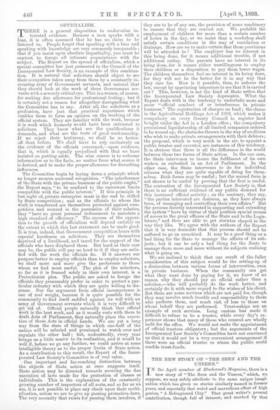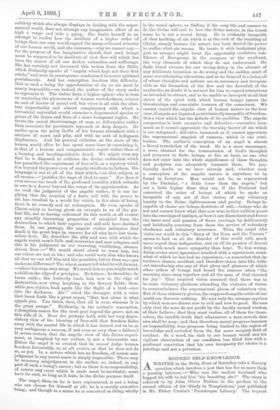THE NEW STORY OF "THE SEEN AND THE UNSEEN."
IN the April number of Blackwood's _Magazine, there is a new story of " The Seen and the Unseen," which, we suppose, we may safely attribute to the same unique imagi- nation which has given us stories similarly named in former years, and especially that weird and marvellous effort of high genius, "A Beleaguered City." That great writer's present contribution, though full of interest, and marked by that subtlety which she always displays in dealing with the super- natural world, does not attempt any imaginative effort of so high a range and wide a grasp. She limits herself to an attempt to realise how the intellect of a higher order of beings than our own would regard the many evils and miseries of our human world, and she assumes,—why we cannot say,— for the purpose of her imaginative sketch, that such beings must he supposed to be destitute of that free-will which has been the source of all our darker calamities and sufferings. She has certainly not borrowed this notion from the Bible, which distinctly speaks of " angels which kept not their first estate," and were in consequence condemned to severe spiritual punishments. And her conception involves this difficulty, that to such a being the apprehension of sin as sin must be nearly impossible,—as, indeed, the author of the story seeks to represent it. The visitor from a higher sphere who is bent on mastering the phenomena of human wretchedness, evinces no sort of horror of moral evil, but views it all with the abso- lute impartiality and almost complacency with which a terrestrial naturalist would examine a degenerated species or genus of the fauna and flora of a more benignant region. He treats the moral shortcomings of man as deformities rather than occasions for passionate reproach or deep despair. He smiles upon the petty thefts of his human attendant with a mixture of scorn and pity, and with no sort of indignant displeasure. And his general criticism on the state of the human world, after he has spent some time in examining it, is that of a lenient and compassionate regret rather than of a burning and inextinguishable dread. We might even say that he is disposed to criticise the divine ordination which has permitted the experiment of free-will, as a mystery which it is beyond the power even of angelic intellects to fathom. His language is not at all of the kind which,—on this subject, at all events,—" justifies the ways of God to man." Nor does it even savour too much of the profound humility which submits in awe to a decree beyond the range of its apprehension. As we read the judgment of the angelic visitor, it is one im- plying that the creation of a finite will with the power to sin has resulted in a world for which, in this state of being, there is no remedy and no redemption. He even speaks of Christ solely as having given an example to us of the per- fect life, not as having redeemed (in this world, at all events) any steadily increasing proportion of mankind from the destruction to which their caprice and self-will have destined them. In one passage, the angelic visitor intimates that death is the great hope in reserve for all who have lost them- selves here. He describes the pity and awe with which the angels watch men's falls and recoveries and new relapses, and this is his judgment on our wavering, vacillating, chance- driven lives :—" We would shout aloud to warn him, but our voices are not as his ; and who could warn him who knows all that we can tell him and the penalties, better than we,—yet makes no difference? The wisest cannot tell what he will do next, —where his steps may stray. We watch him as you might watch a child on the edge of a precipice. He totters ; he stumbles ; he turns aside ; the butterfly leads him now to the edge of destruction, now away laughing to the flowery fields ; then, while you rejoice, back again like the flight of a bird—over into the darkness. Ah !" cried the stranger, with a voice that burst forth like a great organ, "that last alone is what appals you. You think, then, that all is over, whereas it is the great escape." Evidently, in the author's conception, redemption comes for the most part beyond the grave, not on this side of it. Does she perhaps hold, with her very depre- ciatory view of the blessing of free-will, that freedom fades away with the mortal life in which it has turned out to be so very ambiguous a success, if not even so very clear a failure P It seems certain that the angelic view of this divine experi- ment, as imagined by our author, is not a favourable one. Either the angel is so created that he cannot judge human freedom favourably, or, at all events, so that he does not do so, as yet. In a nature which has no freedom, of course mis- judgment in any moral sense is simply impossible. There may be necessary misjudgment in the earlier, or, indeed, in any part of such a being's career; but as there is no responsibility, of course any error which is made must be inevitable, must have its root, so long as it lasts, in the divine purpose itself.
The angel, then, as he is here represented, is not a being who can choose for himself at all; he is a merely executive being ; and though in a sense he is conceived as living wholly in the moral sphere, as finding it his very life and essence to do the divine will and to love the divine nature, in the truest sense he is not a moral being. He is evidently incapable of that loathing of sin which is at the root of the teaohing of Christ, simply because his nature has been denied the power to realise what sin means. He treats it with benignant pity, just as savages might treat the apparently credulous con. Hence of Europeans in the compass or the quadrant, the very elements of which they do not understand. He finds bland excuses for our wrong-doing in the absence of any deliberate intention to do wrong and the sudden onset of some overwhelming attraction, and as be himself is a being all of whose thoughts and actions are as necessary and irrespon-I sible as the formation of the dew and the downfall of the avalanche, no doubt it is natural for him to regard attractions as intended to attract, and to be unable to interpret at all that shiver of the spirit with which human beings ignore the threatenings and convulsive tremors of the conscience. We cannot regard the angelic view of human nature as the true view, if angels are depicted as intrinsically incapable of freedom., It is a view which has the defects of its qualities. The angelic' compassion is both excessive and defective,—excessive, inas- much as it cannot appreciate the warning horror of sin which is our safeguard ; defective, inasmuch as it cannot appreciate the supernatural anguish of remorse, which is our retri- bution. The author's conception of an angel is almost a literal translation of the word. He is a mere messenger, a mere channel for the transmission of God's thoughts and purposes to finite beings, so far, at least, as one who does not enter into the whole significance of those thoughts and purposes can adequately transmit them. We pro- foundly doubt, as we have already said, whether such a conception of the angelic nature is anywhere to be found in Scripture. Man would not be, as represented by the Psalmist, " a little lower than the angels," but not a little higher than they are, if the Psalmist had conceived the order of beings of which he spoke as incapable of any act of free choice, of any voluntary loyalty to the divine righteousness and purity. Beings in- capable of choice are beings destitute of will,—beings who do not and cannot know what that new wine is that volition pours into the cravings of instinct, or how it can disenchant and freeze the inner soul and passion of those cravings by deliberately and habitually averting from them the service of voluntary obedience and voluntary reverence. Thus, the angel who visits our world in this "Story of the Seen and the Unseen "• seems to look on all the disorder of this world with much more regret than indignation, and on all its passion of devout duty with much more sympathy than hope. To him wrong- doing seems mere ignorance touched with a mysterious some- what of which he has had no experience,—a somewhat that in- troduces chance, accident, and therefore chaos, into life, with- out introducing also any of that glory and glamour of which other orders of beings had heard the rumour when "the morning stars sang together and all the sons of God shouted for joy." That inspired vision assumed that there was to be some visionary gladness attending the victories of virtue to counterbalance the supernatural gloom of voluntary vice.
But of these visionary glories, the supposed angelic critic of our world can discover nothing. He sees only the strange caprices by which men are drawn now to evil and now to good. He sees only that the sons do not profit by the hardly earned wisdom of their fathers ; that they must realise, all of them for them- selves, the terrible truth that whatsoever a man soweth that also shall he reap; and that, therefore, moral progress becomes an impossibility, true progress being limited to the region of knowledge and excluded from the far more weighty field of conduct. In a word, his visit to our human world and his vigilant observation of our condition has filled him with a profound conviction that his own incapacity for choice is a privilege and not a privation.



































 Previous page
Previous page